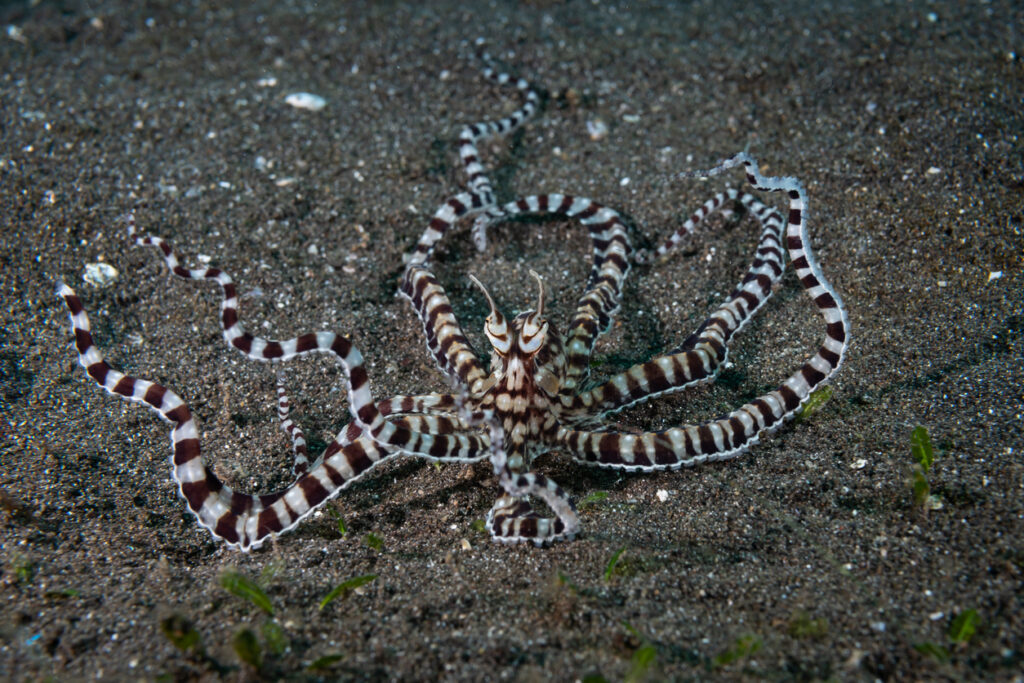The octopus has been on this earth for an incredibly long time, with ancestors of this majestic creature spanning back to around 330 million years. They are fascinating and beautiful to look at, with their rounded bodies and long arms. While many octopuses live along the ocean floor, there are some that live much closer to the surface – and what’s more, you’ll find them in every ocean across the world!
So, with that in mind, we’ve put together an exciting quiz for you to test your knowledge about these brilliant invertebrates, along some with extra facts to fill your brain with!
Why are octopuses so interesting?
Octopuses are invertebrates which means they don’t have any bones. They have large bulbous heads with eyes and multiple arms. They are incredibly intelligent, and typically live alone in dens they build from rocks and shells.
With many different species of octopus, there are so many characteristics and features they have developed to help them survive life in the ocean. For instance, they can fit into small nooks and crannies thanks to their soft bodies, and they have a number of tricks to avoid potential predators. These tricks include being able to escape quickly by shooting themselves forward, and releasing clouds of black ink.
Here at Hastings Aquarium we have our very own octopus called Ponyo! This is Japanese for ‘soft’ or ‘squishy’, which suits her cute appearance perfectly.
Do you know your octopus facts? Take our quiz!
So, how much do you think you know about octopuses? Check out our quiz below and test your knowledge!
Interesting octopus facts
Whatever you scored in our octopus quiz, we’ve got some fascinating facts to further your knowledge on this brilliant sea creatures. If you’ve not taken the quiz yet – be warned, there’s spoilers ahead!
What colour is an octopus’ blood?
You’d be forgiven for thinking an octopuses blood is red, but it is in fact blue. The protein that carries oxygen around the octopus’ body, called haemocyanin, contains copper. Our blood is red because the protein, haemoglobin, contains iron. The copper protein is a lot better at carrying oxygen around the body in cold and low-oxygen conditions just like the ocean.
Are octopuses venomous?
It was previously thought that only the blue-ringed octopus was venomous, but a study carried out in 2009 showed that it is in fact all octopuses that are able to make use of venom!
Australian scientists collected tissue samples from hundreds of species, focusing on three species in particular. They found venom proteins in all three species, but the bigger discovery was that the venom gene seemed to come from a common ancestor.
How many hearts does an octopus have?
An octopus has three hearts, serving different purposes to help the creature’s adapt to its marine habitat. One heart circulates blood around the body, but the other two pump the blood to the gills in order to pick up additional oxygen.
How many brains does an octopus have?
As mentioned, octopuses are incredibly intelligent. This is backed up by the fact that octopuses have 9 brains! They have a centralised brain that is used for overall control, while the 8 other brains can be found in each arm in a group of nerve cells. These brains allow each arm to act independently, allowing the octopus to touch, smell and even move objects.

Can octopuses camouflage?
Octopuses are equipped with specialised cells in their skin called chromatophores that allows them to change colour very quickly. What’s more, they can also change the texture of their skin to match their surroundings too! This is a very handy skill to hide from potential predators like seals, whales and larger fish.
The mimic octopus (Thaumoctopus mimicus) is particularly fascinating, as it doesn’t copy the surrounding landscape but instead disguises itself as other animals in order to avoid becoming another creature’s next meal!
Can octopuses regrow their limbs?
Just like starfish and the axolotl, octopuses can regrow arms if they lose one to an attacker or injury. In fact, if a predator was to grab an octopus’ arm, they can simply shed that arm in order to escape. It takes around 4 months to completely regrow a new arm.
Visit our octopus!
Come and visit Hastings Aquarium and see our octopus with your very own eyes – and show off your new fun facts about this fascinating animal! Check out our visitor information and find out how to get here as well as buying your tickets online.
